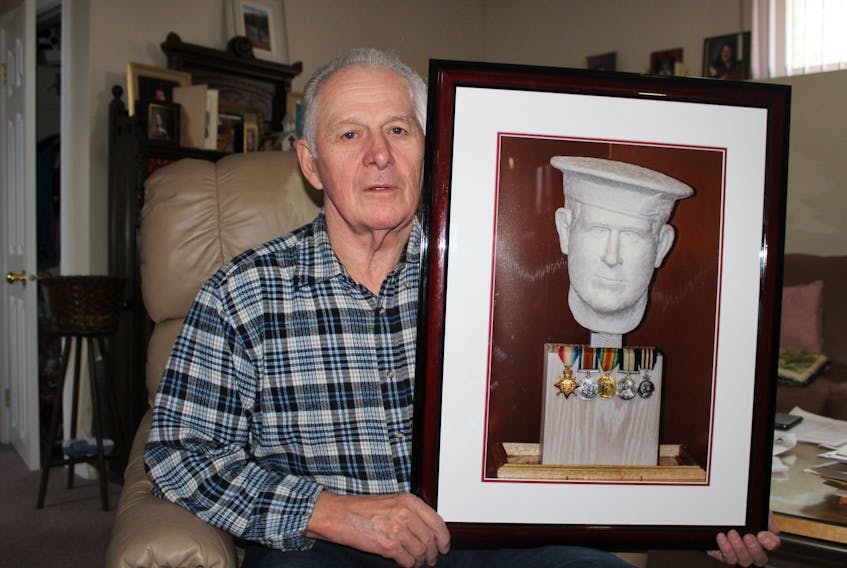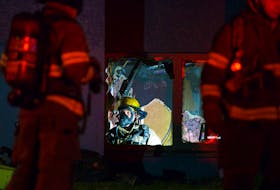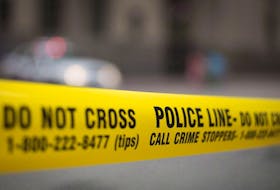It came as no surprise to anyone in the community of Sunnyside when they learned of a local man’s heroics.
Leander Green, an able seaman with the Royal Newfoundland Reservists, was quick to raise his hand when a ship’s captain needed a volunteer to try to save the lives of sailors in the North Atlantic just after midnight on New Year’s 1915 — an ocean that’s frigid at the best of times.
Leander’s son, Everett Green, says his father was the third man from the ship to volunteer to try to get a rope to a sinking ship in an attempt to rescue those on board.
He had already watched two men attempt it and fail. Still, he didn’t hesitate when asked to go.
“I’m proud of my father for making the decision to save the lives of those men,’’ said Everett, a retired inspector with the Royal Newfoundland Constabulary.
“His bravery just showed the kind of man he was, always thinking about somebody else and trying to do the right thing.’’
He said Leander lived his life this way every day, not just when he was called upon.
Everett is one of nine children of Leander and his wife, Mary Blanche. Times were tough trying to feed and clothe them, but they managed.
He said his father was a man of God who spent a vast amount of time in church praying, reading or singing with his strong voice. When he wasn’t in church, he was trying to help his family or others in the community.
“I remember my mother telling me one time, she awoke in the middle of the night and asked him, ‘Leander, what is wrong? Why can’t you go to sleep?’” Everett said.
“He answered her by saying, ‘You know aunt so-and-so, or uncle so-and-so, they don’t have much, and I am worried they won’t have any food when they get up tomorrow.’ So up he got, went downstairs and did up a package of food and went to the home, opened the door and snuck it into the kitchen and left quietly. That is who he was all the time.”
Everett said in his entire life, he never heard a bad word said about his father.
Leander was one of 87 men from the Sunnyside area to sign up to serve in the Great War. A fisherman from St. Jones Without, he joined the naval reserve in 1914, and was among the first group of reservists assigned to active duty.
On New Year’s Eve 1914, his ship, the HMS Hilary, went to the assistance of the SS Maryetta, which had been torpedoed by a German submarine and was sinking in the North Atlantic. The crew of the stricken vessel had no way off, since they had lost their lifeboat.
The only way to save any of them was to get a line from the Hilary to the Maryetta. And the only way to do that was to have someone go over the side with a rope and swim.
Able Seaman Green stepped forward.
In later years, recounting the events of that night to his family, he would say, “I looked over the side and thought, what the hell am I doing out here?”
Then he jumped, with a rope tied around his chest, and the end of the rope in his teeth.
He swam to the sinking ship and — with the rescue rope secured between the two ships — crewmembers of the Maryetta began moving along the rope to the Hilary.
Green stayed with the rope, helping men across. Six men were saved by his heroism.
“Dad never talked about it, but he would go to the parade every Armistice Day,’’ Everett said.
“I would shine his boots for him.”
The Cadet magazine noted at the time that, “Leander Green is a splendid representative of our Naval Reservists — strong, sturdy and vigorous, bright of eye and intelligent — a type of man who sees his duty but to do it.”
When Leander returned from the war, he bought two schooners and went fishing in Labrador. He would sail into St. John’s with his load of fish and then sail back to Sunnyside on his ship, the Dorothy Blundell. He’d package the fish, and Everett would walk all over Sunnyside to ensure those who needed some, got some.
Leander Green died in 1966, the same year Everett joined the RNC, starting the next phase of the Green family’s life of service.
— With files from Barbara Dean Simmons, Saltwire Network









